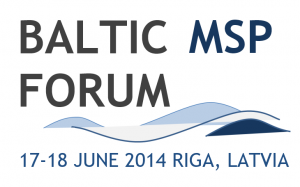 Plenary: Stakeholder Perspectives on MSP – Towards Blue Growth in the Baltics
Plenary: Stakeholder Perspectives on MSP – Towards Blue Growth in the Baltics
Moderator: Angela Schultz-Zehden, s.Pro – sustainable-projects GmbH
Speakers and presentations
- Angela Schultz-Zehden, s.Pro – sustainable-projects GmbH: Towards Blue Growth in the Baltic: Stakeholder Perspectives on the Benefits of MSP around the Baltic Sea - download
- Shipping: Kai Trümpler, German Federal Maritime and Hydrographic Agency (BSH)
- Fishery: Cornelius Hammer, Thünen-Institute of Baltic Sea Fisheries, Germany: ICES – A Trans-Atlantic Maritime Research Organization - download
- Wind energy: Tuuliki Kasonen, General Manager, Estonian Wind Power Association - download
- Energy transmission operators: Mart Landsberg, Convener of ENTSO-E Regional Group Baltic Sea: ENTSO-E’s Ten Year Network Development Plan - download
- Cultural heritage, recreation and tourism: Iwona Pomian, CBSS Working Group on underwater cultural heritage: Cultural Heritage, Recreation and Tourism - download
- Climate change adaptation and mitigation: Maxi Nachtigall, CBSS Expert Group on Sustainable Development – Baltic 21
- DG MARE : Haitze Siemers, European Commission, DG for Maritime Affairs and Fisheries, Head of Unit for Maritime Policy in the Baltic and North Sea
Summaries
Angela Schultz-Zehden, s.Pro – sustainable-projects GmbH
Powerpoint presentation: Towards Blue Growth in the Baltic: Stakeholder Perspectives on the Benefits of MSP around the Baltic Sea – download
The commission staff working paper “A sustainable Blue Growth Agenda for the Baltic Sea region”, the BaltSeaPlan Vision 2030 as well as the summary results of PartiSEApate sector workshops and interviews were referred to for conceptualising Blue Growth in MSP and the Baltic Sea Region.
There are different perspectives on Blue growth and different ways of measurement. Looking at the size of sectors in terms of gross value added and employment, coastal tourism is by far the largest one, followed by fish for human consumption (due to processing and retail) as well as short-sea shipping. On the other hand, newer, innovative sectors such as offshore wind and marine aquaculture are still rather small in size, but they show considerable growth rates. Traditional as well as new sectors are among the ones that experts have rated as sectors with most future potential.
Contrasting these trends and MSP related issues brought up by sector stakeholders in workshops and during interviews with the sustainable MSP Vision 2030 as set out in BaltSeaPlan, it became obvious that further efforts need to be undertaken to integrate sectors into planning.
The shipping and ports sector is expecting further growth, nonwithstanding the upcoming environmental and safety regulations. This growth will require deeper and wider shipping lanes. Ports tend to move out of the city centres and there is the tendency towards fewer and highly developed ports. Although this sector is a competitive one, there is still value to be added through cooperation at sea basin level, e.g. a network of LNG terminals, joint approaches to compliance checks, as well as coherent safety standards and port procedures. Within the sector the understanding of what MSP means is still limited. However, an early involvement of shipping authorities is particularly necessary in the planning process, due to long licensing procedures for ports. Despite the fact that the sector finds it difficult to speak with one voice, there are several platforms for cooperation, e.g. IMO, IALA; IHO and ICS.
Fishery is traditionally very important in all BSR countries and a well-organised sector at pan-Baltic level. As it has faced few spatial restrictions in the past, it is eager to keep this position. With regard to MSP, communication between planners and this sector is insufficient. That is why planners should increase efforts to approach fishery representatives. There is the need for independent funding as well as better data. Pilot projects, integrating the fishery sector, should be carried out. The case of Mecklenburg-Vorpommern shows a positive example of integrating fishery needs into MSP: in the second revision of the plan of Mecklenburg-Vorpommern, essential fish habitats have been designated as priority areas.
Aquaculture produces the same product as fishery, but is a very new sector and so far very small. MSP is seen as a chance to receive greater recognition. The sector struggles with environmental regulations (zero nutrient emission regulations), licencing procedures as well as access to finance. From pan-Baltic cooperation, added value can be generated especially in terms of joint R&D, coherent approaches to legal regulations as well of promotion of the sector itself. Currently, aquaculture sites are hardly ever located in ideal places. Larger and further offshore areas are more suitable environmentally as well economically. However, more research on optimal sites and siting criteria is needed. Aquaculture sites are ultimately no permanent sites, which means they can be moved. Algae/seaweed and mussel cultivation bring the benefit of nutrient removal, but also require more space.
Offshore wind energy is the maritime sector showing highest growth rates, however this growth comes from activities in three countries only: Denmark, Sweden and Germany. The sector is highly dependent on national energy policies in its development. At pan-Baltic level, synergies can be created through smart grid solutions as well as energy trade among BSR countries. However, the political will for such an endeavour is currently lacking. MSP and offshore wind have the potential to reinforce each other as well as to push for a political and economic cooperation in offshore energy as well as grid development across the BSR.
Tourism as a traditional sector and represented in all BSR countries. Underwater cultural heritage has only recently been taken into account by MSP. However, the sector is of relevance, too. The ground of the Baltic Sea is covered with wrecks and other artefacts, submerged sites and relict cultural landscapes, although the exact coverage is unknown. Thus, underwater cultural heritage sets conditions for MSP. There is a CBSS Working Group on this issue which could serve as a platform for dialogue for MSP-related issues. Possible solutions to spatial allocation problems are zoning and site designation. MSP is seen as a chance to foster cooperation with other sectors.
Shipping: Kai Trümpler, German Federal Maritime and Hydrographic Agency (BSH)
Video: Baltic Sea Shipping Visualised through HELCOM Data (click here)
The shipping sector does not have one voice in MSP and is hardly present in consultations. However, its concerns are still taken into account as transport ministries and ports tend to partly represent shipping interests.
Based on AIS data, different aspects and the scale of shipping activities have been illustrated by HELCOM in a video.
Fishery: Cornelius Hammer, Thünen-Institute of Baltic Sea Fisheries, Germany
Powerpoint presentation: ICES – A Trans-Atlantic Maritime Research Organization – download
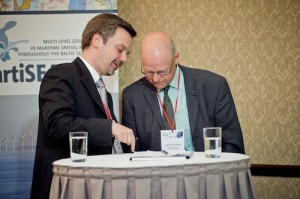 ICES is not a typical representative of the fishery sector, it is rather a research and network organisation consisting of approximately 4000 scientists as well as working groups for coordinating field work and research. Data are compiled, analysed and published. Politicians and managers use the database to take informed decisions. By providing this data, ICES can contribute to MSP. It could play an important role in developing standard formats for data collection in the future and act as a data repository for projects.
ICES is not a typical representative of the fishery sector, it is rather a research and network organisation consisting of approximately 4000 scientists as well as working groups for coordinating field work and research. Data are compiled, analysed and published. Politicians and managers use the database to take informed decisions. By providing this data, ICES can contribute to MSP. It could play an important role in developing standard formats for data collection in the future and act as a data repository for projects.
In 2014, ICES launched a strategic plan setting three priorities: aquaculture, the Arctic and integrated ecosystem assessment. The organisation develops tools and concepts for MSP and ICZM. It conducts research on ocean stressors and the Good Environmental Status and is going to produce ecosystems assessments in regional seas. With regard to the priority of aquaculture, the work of ICES focuses on interaction between aquaculture and the environment. Concerning fishery ICES provides advise on more than 240 fish stocks.
ICES offers training programmes to promote skills, not only for scientists, but also for policy makers and stakeholders. In the future, MSP related trainings could be offered, too.
Wind energy: Tuuliki Kasonen, General Manager, Estonian Wind Power Association
Powerpoint presentation – download
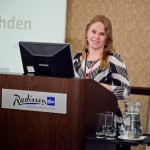 The Baltic Sea Region is a spatial place for offshore energy development. This is illustrated by a BASREC study that marked the optimal sites for offshore wind turbines taking into account the factors distance from the shore, depth and winds. The result reveals that there are many places across the BSR that offer favourable conditions not only in countries that are currently developing wind power.
The Baltic Sea Region is a spatial place for offshore energy development. This is illustrated by a BASREC study that marked the optimal sites for offshore wind turbines taking into account the factors distance from the shore, depth and winds. The result reveals that there are many places across the BSR that offer favourable conditions not only in countries that are currently developing wind power.
MSP creates the conditions for installing offshore energy in the right locations. Therefore, MSP and offshore energy must develop in a similar pace.
Energy transmission operators: Mart Landsberg. Convener of ENTSO-E Regional Group Baltic Sea
Powerpoint presentation: ENTSO-E’s Ten Year Network Development Plan - download
ENTSO-E is a European network of transmission electricity system operators. It has a regional sub-group for the Baltic Sea. The network engages in system development, system operation, creating favourable conditions on the energy market as well as research and development.
With regard to the interdependency of offshore wind and grid development, it can be said that a more comprehensive integration of grids will be needed in the future. Differing national regulations on grids currently hamper the integration process and slow down offshore wind development. A harmonisation of the interconnection planning as well a more efficient communication among responsible bodies would contribute to a more extensive transmission grid in the Baltic Sea.
Cultural heritage, recreation and tourism: Iwona Pomian, CBSS Working Group on underwater cultural heritage
Powerpoint presentation: Cultural Heritage, Recreation and Tourism – download
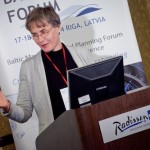 Underwater cultural heritage comprises not only wrecks from different periods (many of which are in a very good condition), but also relict cultural landscapes and prehistoric settlements. The quantitative dimension of underwater cultural heritage sites is unknown. Still, detected sites should be compiled in an inventory.
Underwater cultural heritage comprises not only wrecks from different periods (many of which are in a very good condition), but also relict cultural landscapes and prehistoric settlements. The quantitative dimension of underwater cultural heritage sites is unknown. Still, detected sites should be compiled in an inventory.
It is necessary to open up underwater cultural heritage sites for divers (also in designated underwater waterparks) as well as the general public in maritime museums or through GPS information.
Underwater cultural heritage has positive effects on the tourism sector and helps to strengthen regional identity.
Climate change adaptation and mitigation: Maxi Nachtigall, CBSS Expert Group on Sustainable Development – Baltic 21
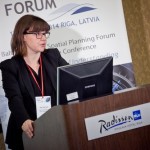 The question, if climate change adaptation and mitigation are still in a nascent phase in the BSR cannot be answered with a clear yes or no. Several projects have helped to place the issue on the agenda. Especially the BALTADAPT project can be mentioned in this respect as it produced a climate change adaption and mitigation strategy. This strategy is currently being followed up by CBSS in cooperation with relevant national ministries as well as pan-Baltic Organisations.
The question, if climate change adaptation and mitigation are still in a nascent phase in the BSR cannot be answered with a clear yes or no. Several projects have helped to place the issue on the agenda. Especially the BALTADAPT project can be mentioned in this respect as it produced a climate change adaption and mitigation strategy. This strategy is currently being followed up by CBSS in cooperation with relevant national ministries as well as pan-Baltic Organisations.
Land-based planning is considered by the strategy in the context of infrastructure development. The link between climate change adaptation and mitigation efforts and MSP, however, needs to be intensified. CBSS already closely cooperates with different sectors, including those of maritime relevance, in the scope of the climate change adaptation and mitigation strategy. Apart from that planners could make use of collected data and planning tools on climate change developed by BALTADAPT and other projects.
DG MARE: Haitze Siemers, Head of Unit for Maritime Policy in the Baltic and North Sea
“A Sustainable Blue Growth Agenda for the Baltic Sea Region” articulates the EU Commission Blue Growth agenda in a regional context. The document reveals that there are a number of sectors with great potential, for instance, tourism, fishery and aquaculture, blue biotechnology, shipping and offshore wind energy production.
Furthermore, the document highlights cross-cutting issues which secure the basis for Blue Growth in the BSR. Innovation is a main driver for growth. Co-existence of sea uses is a reality which can be made use of through synergies. Sustainability is a precondition for all maritime activities and the Horizontal Action “Spatial Planning” of the European Strategy of the Baltic Sea Region offers a forum for bringing different sectors together for MSP purposes. The BSR Blue Growth agenda recommends to develop a maritime technologies masterplan for the BSR and to merge existing Blue Growth related stakeholder fora in the BSR to jointly develop maritime opportunities more efficiently.
Stakeholder workshops with different sectors organised by DG MARE have shown that there is huge interest for MSP. MSP is seen as a fair chance to voice the own position and to arrange coexistence as well as a tool to preserve the marine environment.
The issue of data is another very pressing one. There is no need for more data, but for ways of how to use existing data more efficiently.
Issues raised in the panel discussion
The Finnish defence sector wants to be integrated more strongly in MSP as safeguarding national security is very important for any economic activity. In some countries, e.g. the sectors was reluctant to become involved, although their needs still have to be taken into account by planners.
The question arose whether the aim of bundling of cables can be realistically achieved. This question was contested within the panel. There were different opinions concerning the risk that cables are damaged through anchors and the minimum depth of burying cables to save them from damage.
The findings of the BASREC study, which sited optimal locations for offshore wind power development, were taken up in the discussion. The issue of a wind park was raised, which is currently being developed in South Sweden in a place that does not appear on the BASREC map. The study takes into account the factors: distance from the shore, depth and winds. It neglects other environmental conditions. Therefore, the results of the BASREC study should be viewed as a first indication where to start offshore wind activities only.
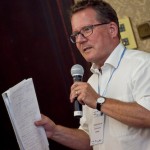 Fishermen feel threatened by MSP as they have always been a major sea use sector. Balancing of interests in MSP is most important and should not neglect the human dimension of allocations. The fishery sector is important to secure food production. If the sector loses out to other sectors, less fish for food will be produced. According to the sector representative, resulting options would only be a partial substitution through increased agricultural production (which negatively affects the environment, too) or importing fish (which goes along with exporting environmental pollution).
Fishermen feel threatened by MSP as they have always been a major sea use sector. Balancing of interests in MSP is most important and should not neglect the human dimension of allocations. The fishery sector is important to secure food production. If the sector loses out to other sectors, less fish for food will be produced. According to the sector representative, resulting options would only be a partial substitution through increased agricultural production (which negatively affects the environment, too) or importing fish (which goes along with exporting environmental pollution).
Nature conservation has been portrayed as a proponent for MSP. The environment could benefit, if MPAs and migration corridors are designated as priority areas. However, there is also the fear among stakeholders with a nature conservation background that all space will be allocated and possible adjustments/expansions of areas reserved for nature conservation will not be possible with plans in place.

